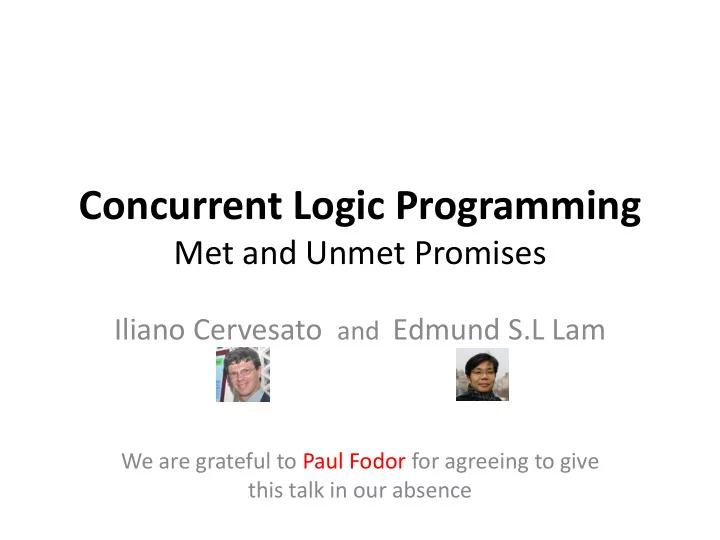

Concurrent Logic Programming Met and Unmet Promises Iliano Cervesato and Edmund S.L Lam We are grateful to Paul Fodor for agreeing to give this talk in our absence
Logic Programming … … the quintessential declarative paradigm Declarative? Promises to promote human-friendly description of a problem » as opposed to hardware-oriented encoding of solution » aka abstraction simplify reasoning » Strengthens assurance, security, performance 1
After 50 years … Making it easier to write programs? Definitely, in some domains » Datalog renaissance of the last 5 years » CLP, tabling, … By and large, (really) hard to write large programs » Extra- logical constructs, flat name space, … Simplifying reasoning? Largely unmet promise … logic programming is a fringe paradigm 2
A new challenge Concurrent and distributed applications Popping up everywhere Mobile apps, Internet-of-things, cloud applications Really hard to get right Communication challenges » Consistent messaging, available sender/receiver, … » … across multiple communicating programs Synchronization challenges » Deadlock, live locks, unwanted race conditions, … APIs available to novice programmers … 3
… a great opportunity for LP No competition from traditional paradigms (yet) Simple, abstract logical specifications of communication and synchronization Forward-chaining AKA logic-based rewriting Nascent reasoning and assurance support Straight from proof theory 4
Writing a distributed application … Node-centric way System-centric way • 1 program for each device • A single program • Peephole view of messaging • Bird eye’s view of messaging • No support to handle • Centralized analysis messaging/synchronization • Automatically compiled to – Programmer on his/her own code that runs on each device • Error-prone and costly • Simple, fast, abstract How most distributed software … is written (opportunity knocking) 5
Comingle A language for mobile distributed applications Not your usual multiset rewriting language … Implements a fragment of first-order linear logic » with locations, strong typing, multiset comprehensions » interfaces with local computation (Android SDK) Forward-chaining semantics (high-level) Distributed stack-based machines (low-level) Implementation for Android devices and i386 A dozen applications A day each to implement, some by undergrads 6
Opportunities Other logic-based forays Meld: language for programming shared-memory multicore systems Netlog: language for P2P applications Yedalog: Datalog for the cloud What is missing Scale Assurance 7
Reasoning about concurrent apps Several promising logic-based techniques Session types Statically catch messaging errors and deadlocks Logical foundation of process algebra Coinductive methods Concurrent programs don’t return a result » Progress through interaction » Termination is unimportant Bridge to process algebraic methods » (Bi)-simulation, refinement, equivalence 8
Take-home message Mobile, concurrent, distributed applications are in need of a good programming model Logic programming can be that model System-centric programming Untapped reasoning potential First initial attempts are promising 9
Recommend
More recommend